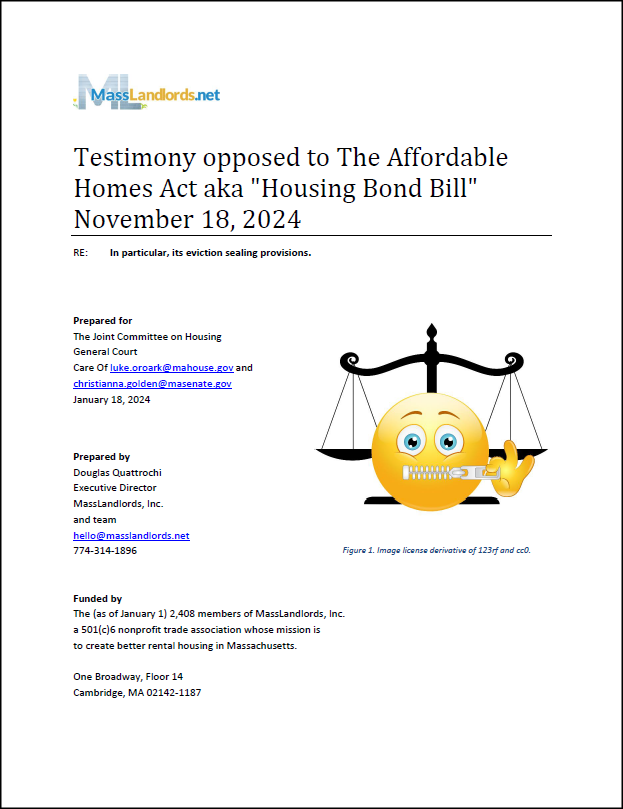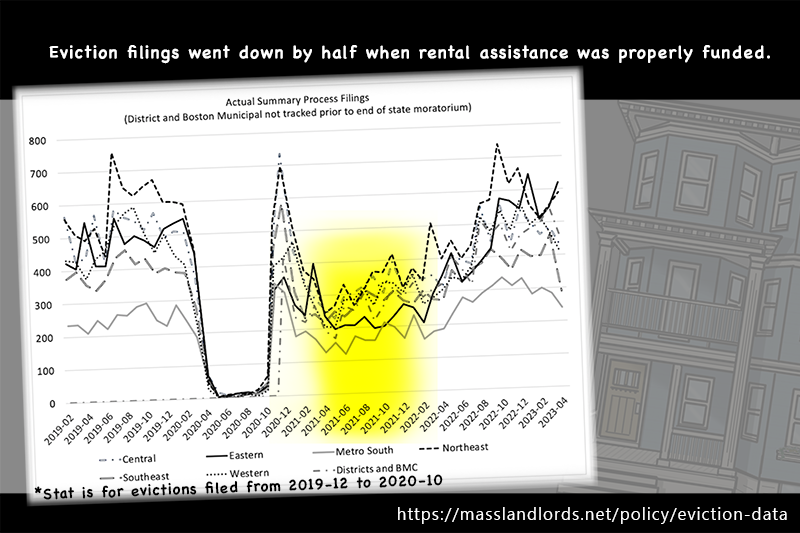MassLandlords Files Testimony Opposed to Affordable Homes Act, Housing Bond Bill, Eviction Sealing
Read our latest on eviction sealing.
On Thursday, Jan. 18, 2024, MassLandlords filed 19 pages of testimony to the Joint Committee on Housing in opposition to 193 H.4138, "The Affordable Homes Act." This bill was proposed by Governor Healey in October and would trigger an additional $4 billion of spending (for context, state budget is $55 billion). Lobbying in support of the bill has been intense to the point of being unlawful. The state has to make budget cuts elsewhere, so this bill is not certain. But eviction sealing has been tacked onto it in an attempt to have it ride the wave of lobbyist support that may get some or all of it passed into law.

We filed 19 pages of testimony.
Our testimony opposed to eviction sealing was largely the same as what we filed last May against "An Act promoting housing opportunity and mobility through eviction sealing," 193 S.956 H.1690. In brief, we acknowledge a limited amount of problem with some landlords denying applicants unfairly on the basis of court records. We detail the impact eviction sealing would have on the courts, on good renters and on landlords. And then we offer clear alternatives.
There are three instances in which a renter has a court record that should not count against them. The first is when they use rent withholding to get the attention of a slumlord who won't make repairs. The second is when they were too poor to avoid eviction but now can sustain themselves and would pass a rental application. The third is when a renter seeks to access the safety net and finds they get a better response by going to court. In all of these cases, a good landlord will learn the applicant is now qualified, but a bad one will not know enough and might wrongly deny the applicant.
Our testimony places evictions in the appropriate context: only 4% of renter households will end up in court in a given year (2020 census: 1.1 million renter households. Eviction filings: 40,000 annually.). We then go on to explain that any time a landlord ends up in court with a renter, something has gone wrong. Every rational, well-advised landlord would prefer to offer relocation assistance than risk a bad court outcome. We also point out that even when a renter is ordered to leave, one-third to half the time they aren't physically removed: they leave on their own terms. So the number of renters who really have no place to go is much smaller than even the 4% who end up in court.
The specific proposal gives timeframes after which renters can petition to have their record sealed. This adds enormous burden to an already overstretched court. Imagine what would happen if every renter named in the past 30 years filed their petition to seal their case. The courts would be able to do nothing but eviction sealing. We discuss how this outcome is likely because of the ease of creating a business out of eviction sealing requests (think of "ambulance chaser" attorneys on highway billboards).
We also detailed eviction case 21SP1694, a perfect example of how even a no-cause-stated eviction can be relevant. In this case, renters who smoked in a no-smoking building managed to dodge the for-cause eviction on a question of evidence. The landlord had filed their eviction with four witnesses who all testified in court that they saw the renters smoking in the no-smoking building. Their smoking was visible from the parking lot. The judge wrote in their decision that they didn't believe the witnesses, because combustion smoke is indistinguishable from vape smoke. Wrong though that was, the landlord did not appeal. They had filed a no-cause-stated case in parallel. This case succeeded, to the relief of the non-smoking neighbors.

CC BY-SA 4.0 Jennifer Rau MassLandlords
A couple of alternatives are clear.
First, when rental assistance was properly funded during the pandemic, eviction filings went down by one half. That's great. We need more of that.
Second, if there are landlords out there who are discriminating, then we can use the discrimination law and enforcement mechanism we already have. A new protected class could be added for eviction records requiring us to treat them on a case-by-case basis, same as we already do for criminal. That's not hard. It's not expensive.
Eviction sealing also requires journalists and researchers, like MassLandlords staff, to get court permission before using eviction data. That's not how democracies work. If we can't see and write about court cases, we have no assurance of justice.
The most disagreeable thing about this bond bill is that it offers $4 billion of public money and not a cent to the Housing Courts. The courts received 38,863 eviction filings in 2023. Counting all the judges and mediators available to hear these cases, and assuming each case has both a judge and a mediator on it, that leaves each full-time court person at most one hour per case, with no time to read the law, do admin or take vacation. Eviction sealing would reduce court staff availability to between six and 30 minutes per person per case.
We will keep you informed. If you wish to support our policy work, please join as a member and make additional contributions via the Property Rights Supporter program.
Join as a member and property rights supporter to sustain our advocacy before it's too late.




